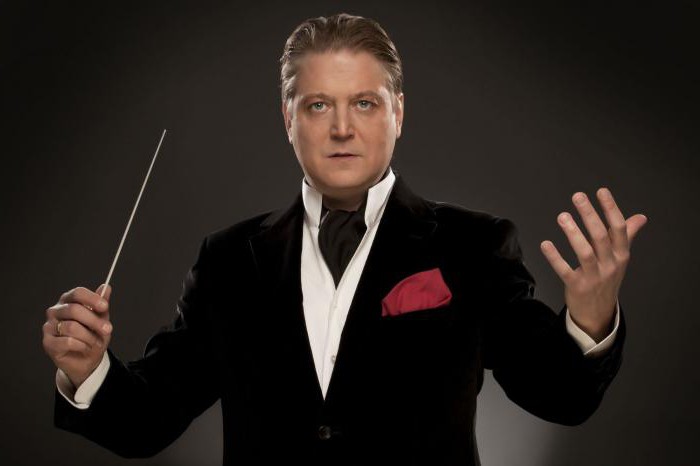When Alexander Vitalyevich Sladkovsky came to the post of chief conductor and artistic director of the State Symphony Orchestra of the Republic of Tatarstan in 2010, ill-wishers called him “Varangian” and “upstart” behind him. However, they did not succeed in weaving intrigue for a long time, because for several years the maestro was able not only to fully reanimate the team in ruins, but also to bring it to the world level.
Family and music education
On October 20, 1965, the famous Russian conductor Alexander Sladkovsky was born in Taganrog. The family of little Sasha consisted of musicians: his dad played the clarinet, and his mother was a pianist. From the age of five, the boy attended the Taganrog music school named after Tchaikovsky. Its leader was Ninel Ivanovna Bortsova. At 10, Sladkovsky moved to Moscow and entered the cadet music school. After 3 years, he ended up in the Great Hall of the Moscow Conservatory for a performance by the outstanding Soviet conductor Yuri Temirkanov and realized that he wanted to connect his life with conducting. Subsequently, Alexander Vitalyevich entered the military conducting faculty of the Moscow Conservatory. Tchaikovsky. The second higher musical education Sladkovsky received at the St. Petersburg Conservatory. Rimsky-Korsakov, where his mentor was the famous conductor, choirmaster and teacher Vladislav Alexandrovich Chernushenko.
Beginning of a creative career
In 1997, the conductor's debut of Sladkovsky was held at the Opera and Ballet Theater at the St. Petersburg Conservatory. The first piece of music that the maestro staged was Mozart’s opera, “Everybody Does That.” In the same year, Alexander Vitalyevich was accepted as a conductor in the symphony orchestra of the Academic Capella of the Northern capital.
In 1999, Alexander Sladkovsky became the winner of the Third International Competition of Conductors. S. Prokofiev. From this moment, the career of a young man begins to skyrocket. In 2001, he was invited to the place of chief conductor of the State Opera and Ballet Theater, where he debuted four years earlier. In parallel, he continued to work in the St. Petersburg Chapel. In 2004-2006, the maestro held the post of its chief conductor.
Conducting in the second half of the 2000s
In 2005, Alexander Sladkovsky, together with Maurice Jansons, worked on the production of Bizet's opera Carmen. A year later, he was invited by the outstanding cellist Mstislav Rostropovich to prepare the program “Unknown Mussorgsky”. Both projects, in which Sladkovsky took part, were held at the St. Petersburg Conservatory and caused a lot of enthusiastic responses from viewers and music critics.
In the second half of the 2000s, Alexander Vitalyevich conducted in the New Russia Symphony Orchestra, led by Yuri Bashmet. By this time, the fame of Sladkovsky had spread far beyond the borders of the Russian Federation, and many musical groups considered it an honor to work with him. He collaborated with the orchestras of Dresden, Budapest, Sicily, Belgrade, Lower Saxony, took part in major international projects, performed with D. Matsuev, Yu. Bashmet, I. Bogacheva, N. Petrov, M. Tarasova and other stars.
Moving to Kazan
After Fuat Mansurov, the chief conductor and head of the Tatarstan State Symphony Orchestra, died in the summer of 2010, the president of the republic, Rustam Minnikhanov, personally invited Alexander Vitalievich to take a vacant seat. Sladkovsky accepted the offer of Rustam Nurgalievich and moved to Kazan with his wife Victoria. The new leader in Tatarstan was met without much joy, because there were enough people who wanted to lead the team among local artists. Alexander Sladkovsky was given the nicknames "Varangian" and "upstart", and because of the harsh manner of managing the collective, he was called the "soldier". However, soon the visiting conductor was able to prove to everyone that it was not in vain that he moved to Kazan. After he turned the orchestra into one of the most powerful professional music groups in Russia, ill-wishers behind him suddenly fell silent.
The revival of the orchestra
What did Alexander Sladkovsky do for the Tatarstan symphony orchestra? The biography of the conductor indicates that in 2010 he got a practically collapsed team, which had neither new instruments, nor a modern rehearsal room, nor a worthy repertoire. The musicians received a meager salary and were not interested in working for that kind of money. Symphony concerts were not popular in Kazan and were held in half-empty halls.

Having become the artistic director and chief conductor, Sladkovsky decided to completely change the management system of the orchestra. First of all, he secured a regional grant of 120 million rubles. The funds were used to purchase new instruments of the best brands and solve other material problems of the orchestra. Alexander Vitalievich managed to do the almost impossible: with him, the salaries of musicians increased 3 times. This allowed us to make the profession of an orchestra student in Kazan prestigious and in demand. However, raising salaries was only half the battle on the road to success. To make the Tatarstan State Symphony Orchestra one of the best musical groups in the country, Sladkovsky demanded strict discipline from subordinates. If earlier appearing at a rehearsal unprepared for the orchestra was commonplace, today he faces dismissal for such an attitude to work.
Expanding repertoire, holding festivals
Khudruk Sladkovsky Alexander achieved a significant expansion of the repertoire of the orchestra. Under his predecessor, the musicians gave no more than 22 concerts per season, with half of them repeated. Today they play 80 concerts over the same period, of which 75 are new. Alexander Vitalievich initiated the holding of such international symphony festivals in Kazan as Denis Matsuev with Friends, Rakhlinsky Seasons, Kazan Autumn, White Lilac, which made it possible for residents of the capital to personally attend concerts by world famous performers. The Tatarstan Symphony Orchestra conducted by Sladkovsky is known today not only in Russia but also abroad. The achievements of the maestro did not go unnoticed at the national level. In the spring of 2016, V. Putin signed a decree on awarding the title of People's Artist of Russia to Alexander Vitalyevich.
Symphony orchestra and children
Alexander Sladkovsky made a lot of efforts to popularize symphonic music among the younger generation. Children, in his opinion, should get acquainted with the works of classics from an early age, then in adulthood they will be happy to attend concert halls. To arouse their interest in symphonic music, the conductor regularly invites high school students to perform at his orchestra.
The role of the wife in the work of the maestro
Thanks to Sladkovsky, symphonic music in Kazan has become very popular today. Concerts under his leadership are held in crowded rooms. Managing such a large team of creative people is not easy at all, so music fans are often interested in where Alexander Sladkovsky finds strength in himself? The wife (photo below, far right), according to the maestro himself, is his main support and muse. Victoria Viktorovna became for Alexander Vitalyevich not only a wife, but also a reliable assistant and a strong rear in his difficult task.

Sladkovsky never tire of repeating what happened as a conductor only thanks to his wife. When the conductor was offered to work in Kazan, Victoria immediately supported him and moved with him to the capital of Tatarstan. She deals with all issues related to her husband’s work, conducts business negotiations, draws up concert schedules. Having freed the conductor from the routine, Victoria Viktorovna provided him with the opportunity to fully surrender to art and not be distracted by extraneous matters.